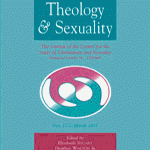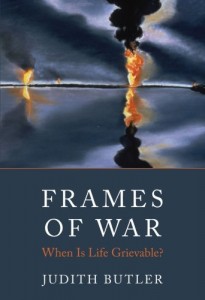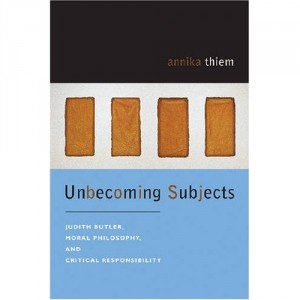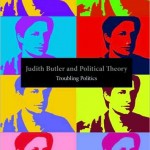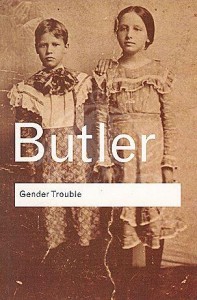In the documentary, Judith Butler: Philosophical Encounters of the Third Kind, Butler recounts details of growing up in Cleveland:
I was never very good in school. I was what they call a problem child. A disciplinary problem. And, uh, I would speak back to the teachers. And I would not follow the rules. I would skip class. I did terrible things. And, yet, I was apparently smart in some way. But I didn’t understand myself as smart. I understood myself as strategic. One had to get through. One had to find one’s way in the school and in the synagogue. And I didn’t really like authority. My mother was called into the principal’s office…the principal who runs the school in fifth grade, I think. Probably the age of 11. She was warned that I might become a criminal and at that point they told me that I couldn’t go to the school anymore, to the Jewish Education program anymore, unless I studied privately with the rabbi. So, this was for me, terrific because I loved the rabbi.
Now consider how Liz McMillen shapes those details (given to her by Butler in an interview from 1997 entitled “Berkeley’s Judith Butler Revels in Role of Troublemaker” for The Chronicle for Higher Education) into a coherent—and rather neat and tidy—narrative and origin story about Butler as a troublemaker:
Long before Gender Trouble caused a stir, and before she became a prominent theorist with a devoted graduate-student following, Judith Butler was a kid in a Cleveland synagogue who frequently got herself in trouble. She disrupted classes. She made faces during assemblies. Finally, she was kicked out and told that she wouldn’t be allowed to return to the school until she had completed a tutorial with the head rabbi. The rabbi sized the 14-year-old up and decided that it was time for her to get serious.
So what do you want to study? he wanted to know.”Holocaust historiography” was her quick reply. Martin Buber and existential theology. Whether German idealism was responsible in any way for the rise of fascism. This after-school punishment laid the groundwork for a scholarly career marked by extreme diligence — and a knack for making trouble.”I was always talking back,” she says.”I guess I’ve elevated it into an art form.” Once a disciplinary problem, always a disciplinary problem.
So, according to McMillen, Butler was an unruly child. A student who refused to play by the rules and got into a lot of trouble. A disciplinary problem. Now, she is an adult who gets into a lot of trouble. She disrupts widely accepted notions of sex and gender. She challenges feminism as identity politics. She refuses to merely accept any idea as common sense. And she encourages others to be critical of their most treasured values. It would seem that Butler willingly (perhaps even proudly) takes on the role of unruly-child-as-troublemaker. Her acts of trouble (which up to the point of the interview included: Subject of Desire, Gender Trouble, Bodies That Matter, The Psychic Life of Power, and Excitable Speech) are at least partially inspired by a desire to continue to be a disciplinary problem. She finds pleasure in instability, being uncomfortable, and pushing at the limits. She enjoys laughing at/mocking the system and causing trouble for all those who perpetuate it. She even mocks herself and refuses to cash in on her status as superstar academic.
Samuel Chambers and Terrence Carver reinforce this assessment of Butler as the unruly child when they write in their introduction to Judith Butler and Political Theory: Troubling Politics:
how else to read the line that Butler leaves on its own as the fourth paragraph of the preface to Bodies That Matter, ‘Couldn’t someone simply take me aside?’, than with more than a touch of sarcasm and sass (x)? What other way to hear this question than as Butler’s declaration that she plans to continue getting into trouble, that she never expects to get out it? While her critics will persist in their desire to force her into line, she will continue to make trouble–and to trouble them (2).
And while they aren’t certain that she is actively taking up the trope of the “unruly child” (“We could ask her–she might even answer us,” they ponder, “but we’d still never know“), they do suggest that Butler’s role as the “disciplinary problem” is proof that she is a troublemaker. See, she disobeys. She disrupts. She sasses back. She must be a troublemaker. Immediately following this discussion, Chambers and Carver suggest that, while Butler is engaging in unruly behavior, her actions “prove to be of the far more sophisticated and important sort” (2). So, Butler is not just your average disciplinary problem, she is a serious and sophisticated disciplinary problem.
So, as the story goes: once upon a time there was a little girl from Cleveland. She always got into trouble…big trouble. She challenged authority figures. Disrupted class. And got kicked out of school. Everyone thought she was a disciplinary problem. Then, she grew up and became an academic superstar. She learned how to turn her knack for troublemaking into some serious and sophisticated scholarship about troubling sex, gender and sexuality. And she remained a disciplinary problem.
Sounds great, right? I like the idea of rethinking what it means to be a disciplinary problem (and I can relate to it, having gotten into trouble a lot as a child), but this narrative (particularly about Butler’s beginnings and more generally about the origins of troublemaking for theory and politics) raises some red flags for me.
The purpose of the narrative
First, the story offers some background on Butler. It demonstrates that she is a person and not just a theorist. In the McMillen interview, Butler reflects on the desire, by her readers, to know who she really is:
I was so theoretical in my presentation in Gender Trouble and Bodies That Matter that you barely got a glimpse of who I was, which then produced this desire to expose this hyperintellectual, you know, hidden person.
Second, the story also offers some background on Gender Trouble and the idea of troubling gender. They come from someone on the outside, from a problem child, who always challenged authority. Gender Trouble, according to the story, is just one more (perhaps more sophisticated and “grown up”) example of how a “problem” child acts.
Finally, this story provides both Butler, as a queer theorist/theoretical activist/political thinker, and her work in Gender Trouble and beyond, with some credibility in queer activist communities. Butler isn’t just an academic who writes esoteric and overly complicated books like Gender Trouble; she is a bad girl! A rebel! She makes trouble for the establishment! She resists and fights back! And, where did it all start? When she was (*gasp*) a juvenile delinquent!
How much control has Butler had over the shaping of this narrative and the image of her as feminism’s and queer theory’s bad girl? Is the playing up of her as a problem-child a marketing ploy by others to sell more books? Or, could it be an attempt to discredit her work in troublemaking as childish? Oh, don’t bother with her, she’s nothing but trouble!?
The person as Subject/the author as Agent
The story, particularly the one articulated by McMillen, feels a little too neat and tidy. There appears to be a seamless connection between (1) the person who made trouble as a child with (2) the author who not only writes about trouble but makes it too (!), and (3) the book that successfully makes trouble for our understandings of gender/sex/sexuality. But, does Butler-the-person really fit that neatly with Butler-the-author? Does the move from Butler-the-person to Butler-the-author work that easily? And, does Butler-the-author have that much control over what her book did/does?
In the first chapter of Gender Trouble, Butler famously invokes Nietzsche and argues that “there is no doer behind the deed” (34). She challenges the idea of the agent as willful subject who has (total) control over their actions. She offers in place of the person who does, a subject who is created/perpetuated through the process of doing. Where might the story of Butler as a troublemaker fit in here? Is it reinforcing the notion of the person-as-willful-agent?
And, what about the connection between author and book? What control does Butler-as-author really have over what her writings do and mean for others? I need to think through theses ideas some more, but I wonder what we might make of this narrative in relation to Butler’s word at the end of Bodies That Matter. She is discussing the troubling question, “How will we know the difference between the power we promote and the power we oppose” (241)? In her reflections, she discusses her writings and the effects they might have on others:
The reach of their signifiability cannot be controlled by the one who utters them. They continue to signify in spite of their authors, and sometimes against their authors’ most precious intentions.…This not owning one’s words is there from the start, however, since speaking is always in some ways the speaking of a stranger through and as oneself (241-242).
Finally, in offering up this story of herself (through her written and spoken words) as an unruly child who turned into a troublemaking adult, what is Butler doing? Or, conversely, what is being done to her? In one of her more recent works, Giving an Account of Oneself, Butler argues that “telling a story about oneself is not the same as giving an account of oneself” (12). So, which is it–is the tale of Butler-as-unruly-child a story/narrative or an account? I am eager to re-read Butler’s ideas in Giving an Account to find out what she might say about all of this.
Okay, she was a disciplinary problem, but why?
The story of Butler as a disciplinary problem is compelling, but it leaves a lot out in the telling. Why was she considered a disciplinary problem? Or, more pointedly, what caused her to make (and be in) trouble? In “What is Critique?,” Butler writes:
One does not drive to the limits for a thrill experience, or because limits are dangerous and sexy, or because it brings us into a titillating proximity with evel. One asks about the limits of ways of knowing because one has already run up against a crisis…(307-308).
What sorts of crises did Butler run up against that made her push at the limits (against authority figures, etc)? Without a discussion of why, we are left with a narrative that is too easy and that could too easily become a story of a girl who was bad (maybe born that way?) and then found a way to continue to be bad (and earn money doing it!) as an adult. There is much that should be said/written about what causes girls to act out and/or to be dismissed/punished as troublemakers. In fact, the specific ways that gender and trouble get connected is part of the reason Butler wrote Gender Trouble. Take a look at her discussion of “female trouble” in her 1990 Preface for more. Of course, Butler speaks to the “why” in many of her writings. So, why is it left out of the narrative of unruly child–particularly the one shaped by McMillen?
*Note: At this point, I must veer off into a discussion of Laura Ingalls Wilder in Little House on the Prairie. A couple of weeks ago, I wrote an entry about half-pint and the episode, “Troublemaker.” I promised to watch it and report back. I watched it yesterday morning. Actually, I had intended this article to be about Laura as one example of the “unruly child” and what kind of trouble they cause (or are accused of causing). As you can tell, this entry has gone in a different direction. I enjoyed the episode–aside from the fact that it convinced me that Mrs. Oleson is just plain evil. I was surprised out how much room there is for a feminist interpretation of how/why Laura is labeled as a troublemaker. I would like to devote an entire entry to it (and perhaps include the recent New Yorker review article about Laura Ingalls Wilder and Rose Wilder Lane and some other thoughts from Little House in the Big Woods). Anyway, my point in referring to Little House and Laura here is that the “Troublemaker” episode offers one example of how/why a little girl might be dismissed and also punished for being a troublemaker. The (how/why) reasons have a lot to do with the fact that she is a poor little girl with no money who has very little status or, in Bourdieu-speak, cultural capital. The narrative of Laura as troublemaker in this episode has as much to do with how she has been labeled a troublemaker (and the consequences of that labeling) as it does with what kind of trouble she makes. What would a narrative of Butler that linked her troublemaking with her experiences growing up in Cleveland look like? Butler only hints at that in her 1999 Preface to Gender Trouble.
The origins of troublemaking:
The story of Butler as an unruly child seems to function as an origin story for gender trouble, both as a book and as a concept. To the question, where did gender trouble come from, we get the answer, a problem child who skipped class, made faces at assemblies, and did other terrible things. So, according to this line of thinking, troublemaking as a concept/practice/action is produced by someone who does it in order to disrupt/unsettle/disturb. And this disruption that they do takes some very particular forms: skipping class, disrupting assemblies, being kicked out of school, all of which conjure up images of the juvenile delinquent. But, is this the only source of troublemaking and the only way to imagine how children engage in it? Is the troublemaker fundamentally a bad girl (or bad boy) who willfully flouts the rules?
At this point, I have to stop writing this entry. I have more to say, but have run out of steam. I do like my final thought here. I will return to it an upcoming entry. The question becomes: is troublemaking all about daring to be bad (this is a reference to Alice Echols’ book) or could we think about it as daring to be good (another reference to the edited collection by Ann Ferguson and Bat-Ami Bar On)? What would that look like and what possibilities for ethics does it open up?

